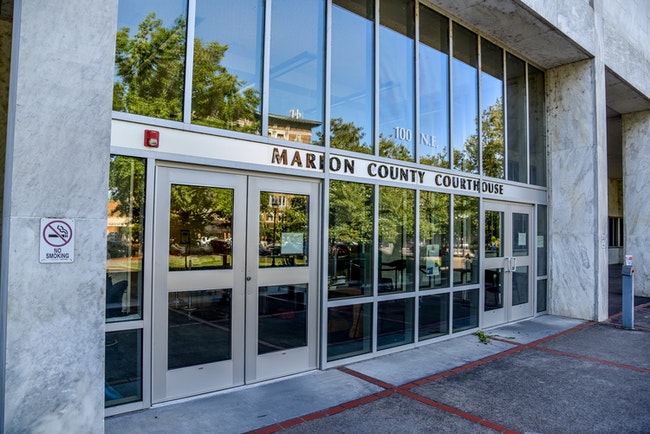 Marion County Courthouse (File/Salem Reporter)
Marion County Courthouse (File/Salem Reporter)
After inmate Billy Gostevskyh asked for days for help for pain in his already-damaged right eye, the Marion County Jail’s doctor advised him to see an ophthalmologist as soon as possible.
The next day, jail employees sent him to a work-release transition center, where he would have to arrange and pay for his medical care. Gostevskyh ultimately lost his eye.
Whether county jailers acted with “deliberate indifference” toward Gostevskyh is now a question heading to federal court. Gostevskyh sued Marion County and then-sheriff Jason Myers in December 2015 for close to $482,000 damages.
A federal judge in Eugene last month approved the case to go to trial. A trial date has not yet been set.
[ Help build Salem Reporter and local news – SUBSCRIBE ]
The judge’s decision comes on the heels of a U.S. magistrate judge order over the summer describing the chain of events at the jail as “troubling.”
In his ruling, U.S. Magistrate Judge Thomas Coffin wrote Marion County’s attorneys couldn’t explain why jail staff sent Gostevskyh to the transition center immediately after the jail’s doctors told him he needed to see an ophthalmologist.
The transfer raised questions because the transition center is typically used by inmates near release for jobs training, while Gostevskyh had barely started his 180-day sentence, Coffin wrote. New inmates to the transition center are also subject to a seven day “blackout” for medical appointments, unless there is an emergency, per jail policy.
Coffin wrote Marion County’s attorneys couldn’t account for why the inmate was moved or who made the decision.
“The record before the court is devoid of any explanation as to why the plaintiff was transferred to the transition center the very next day after his examination by (the jail’s doctor), or who at the jail ordered the transfer,” Coffin wrote. “Because of the transfer, however, (the referral to the ophthalmologist) was ‘put on hold.’”
Gostevskyh had problems with his right eye before he started his jail sentence in December 2013, according to the lawsuit, but he could still decipher shapes.
However, the lawsuit said Gostevskyh had a seizure on Dec. 18, 2013, in his jail cell right as his toilet overflowed. He reportedly fell to the floor and contaminated his eye with fecal matter.
In the following days Gostevskyh reportedly lost what was left of his sight. His eye felt like it “would pop” from pain, according to federal court documents. He repeatedly filed forms asking for medical attention. He met with nurses at least twice before getting to see the jail’s doctor on Dec. 30, 2013.
The day after being referred to an ophthalmologist, Gostevskyh was transferred to the transition center, Coffin noted.
“Medical and dental services are not provided at the transition center while an inmate is lodged there,” Coffin wrote. “Rather, an inmate… is required to arrange for his own medical services through his own private physician and is responsible for payment of those services.”
Marion County attorneys argued that jail employees treated Gostevskyh appropriately.
In court filings, Marion County Legal Counsel Jane Vetto wrote the Gostevskyh “voluntarily transferred” to the transition center. She wrote that Gostevskyh transferred back to jail two days later, on Jan. 2, 2014.
“Thus, (Gostevskyh) was never subject to a ‘seven-day blackout period’; instead he went into the transition center for two days, then transferred back to the jail and was seen that same day by jail medical staff,” she wrote in a May filing.
Vetto also wrote jail medical staff examined Gostevskyh seven times between Dec. 19, 2013, and Jan. 6, 2014, including visits with nurses before and after seeing the jail’s doctor.
The jail subsequently sent him to two ophthalmology specialists.
Gostevskyh saw an ophthalmologist Jan. 13, 2014, who recommended he go to the Casey Eye Institute at Oregon Health & Science University. A doctor at the university told him the next day that the best course of action was to remove the eye.
Vetto also argued that Gostevskyh’s own injury history caused the injury. Gostevskyh suffered an eye injury when he was 9 and had an eye surgery at the age of 18. One of the ophthalmologists reported Gostevskyh couldn’t “think of an inciting event” for his recent eye problems.
“The record is clear that plaintiff’s eye complaints were related solely to a pre-existing loss of vision and susceptibility to eye swelling caused by a traumatic childhood injury, not to the jail medical service policy or to any event that occurred while he was incarcerated in Marion County,” Vetto wrote.
Marion County attorneys have said arguments made by Gostevskyh and his attorney do not prove the county acted indifferently.
None of that explains why jail staff sent Gostevskyh to the transition center in the first place, in a demonstrably harder position to get the medical care he repeatedly asked for, Coffin wrote in his ruling.
“The transition center, as its name implies, is designed to assist inmates who are nearing the end of their sentences to ‘transition’ back into society through a work release program,” Coffin wrote. “(Gostevskyh), however, was barely into his 180-day sentence, with approximately 170 days remaining.”
“The court repeatedly queried Marion County counsel to no avail as to the identity of the county official who ordered the transfer and the reasons for the transfer,” Coffin added. “Instead, counsel repeatedly responded that ‘they’ or ‘the jail’ ordered the move and that the transfer was ‘voluntary.’”
Coffin also noted Marion County has no record showing Gostevskyh consented to his transfer.
Coffin wrote that Gostevskyh’s ongoing eye issues were “chronic” that the jail’s doctor couldn’t treat, requiring the opinion of an eye specialist.
“To state the obvious, a corrections facility has a constitutional obligation to provide adequate health care to inmates with serious medical needs,” Coffin wrote. “In cases such as this, where an inmate’s constitutional right to adequate medical care for serious medical needs is an issue, transparency is of utmost importance and the questions the court has raised require forthright and non-evasive answers.”
Jose Cienfuegos, Gostevskyh’s attorney, said he was alarmed the “lack of information” about how and why his client landed in the transition center.
“One has to wonder what was the decision-making going on here at that time,” Cienfuegos said.
Without such information, Cienfuegos said, it’s hard to tell if his client’s experiences were strangely problematic or if there is a systemic issue.
“It’s unfortunate that it’s bigger injuries or bigger delays in medical treatment that cause larger injuries, and that those are the ones that come to the forefront of the news,” he said.
Marion County attorneys objected to Coffin’s order in August, urging U.S. District Judge Ann Aiken to dismiss the case. Aiken on Sept. 30 denied the request.
Have a tip? Contact reporter Troy Brynelson at 503-575-9930, [email protected] or @TroyWB.









